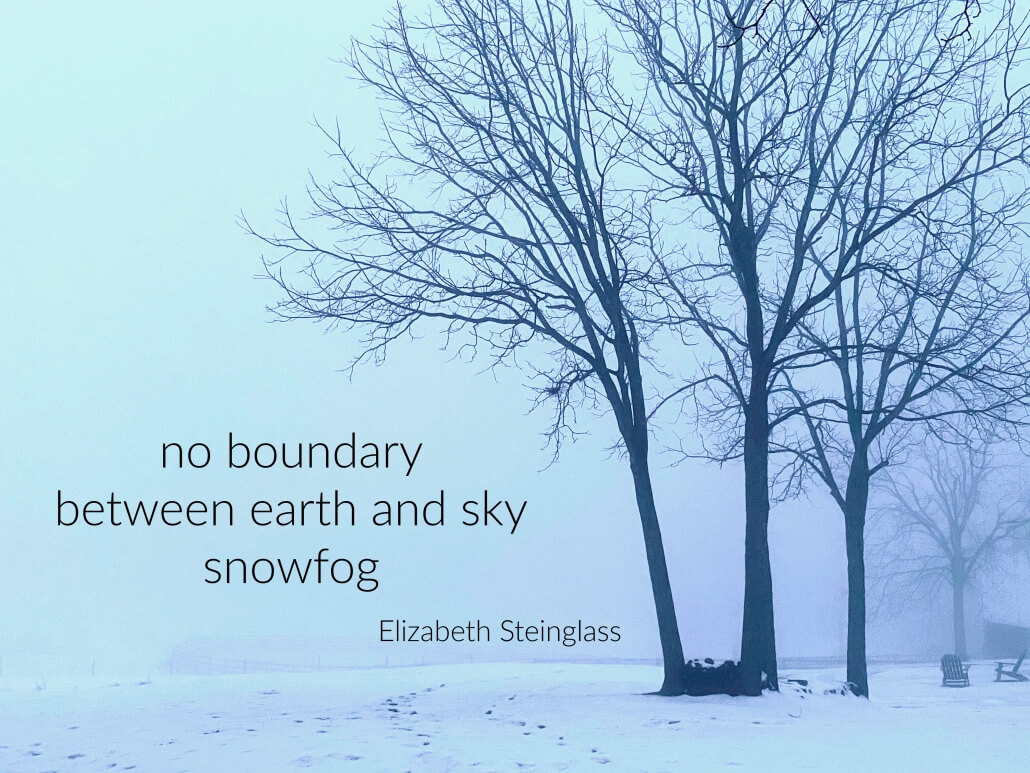
Wishing you all health, peace, joy, connection, poetry, and time to enjoy the natural world.
Liz

Wishing you all health, peace, joy, connection, poetry, and time to enjoy the natural world.
Liz
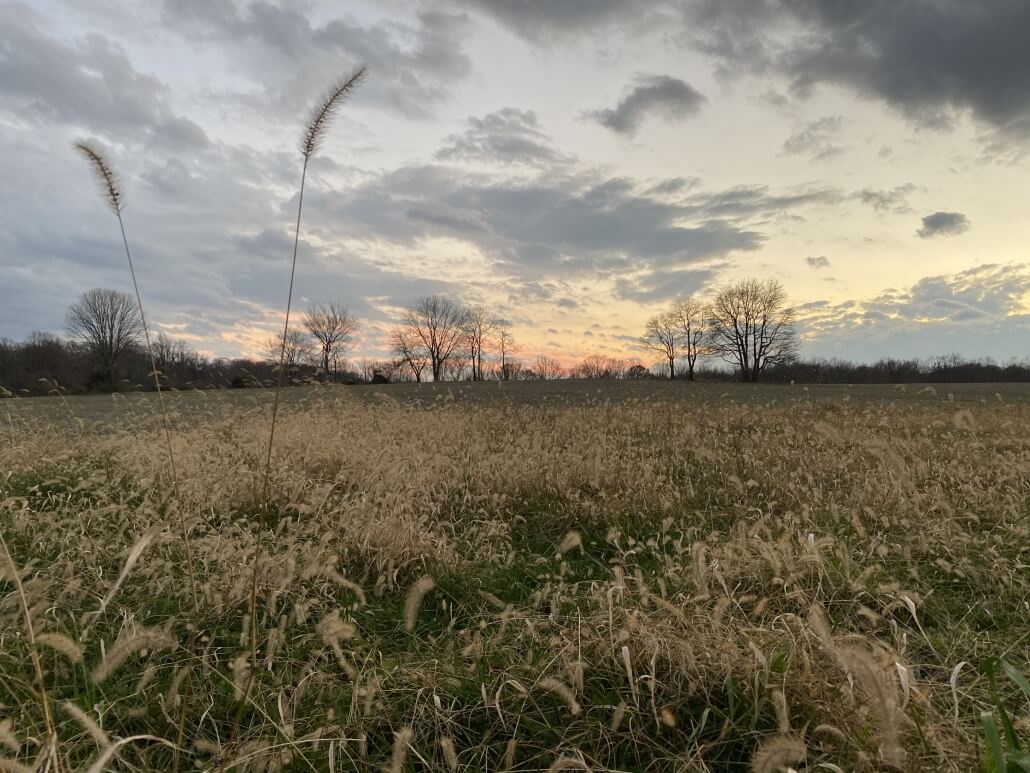
I am winter’s meadow
I am winter’s meadow
grasses gone to seed
wearing frayed regalia
drained of summer’s green.
I will stand here steadfast
in sun, sleet, snow
waiting for the someday
life rises from below.
Yesterday my youngest asked me to read what he was working on–a one paragraph discussion of a poem by Emily Dickinson. Back in my office I continued reading chapter 3 of Ted Kooser’s The Poetry Home Repair Manual (which I am enjoying very much!). Kooser describes a poem as a moment at the window in which one sees both a reflection of the writer and the view outside the window. Depending on the light, the reader will see more of the poet or more of the world. I turned the page and there again was Emily Dickinson, his example of a poet looking at her reflection:
It’s all I have to bring today–
This, and my heart beside–
This, and my heart, and all the fields–
And all the meadows wide–
Be sure you count–should I forget
Some one the sum could tell–
This, and my heart, and all the Bees
Which in the Clover dwell.
I jotted a note to myself to write a poem in which I express my feelings through the landscape. A few minutes later I closed the book and wrote the poem above. Only later did I discover that yesterday was Emily Dickinson’s birthday!
Happy Poetry Friday to you all. Buffy Silverman has the roundup.
Liz
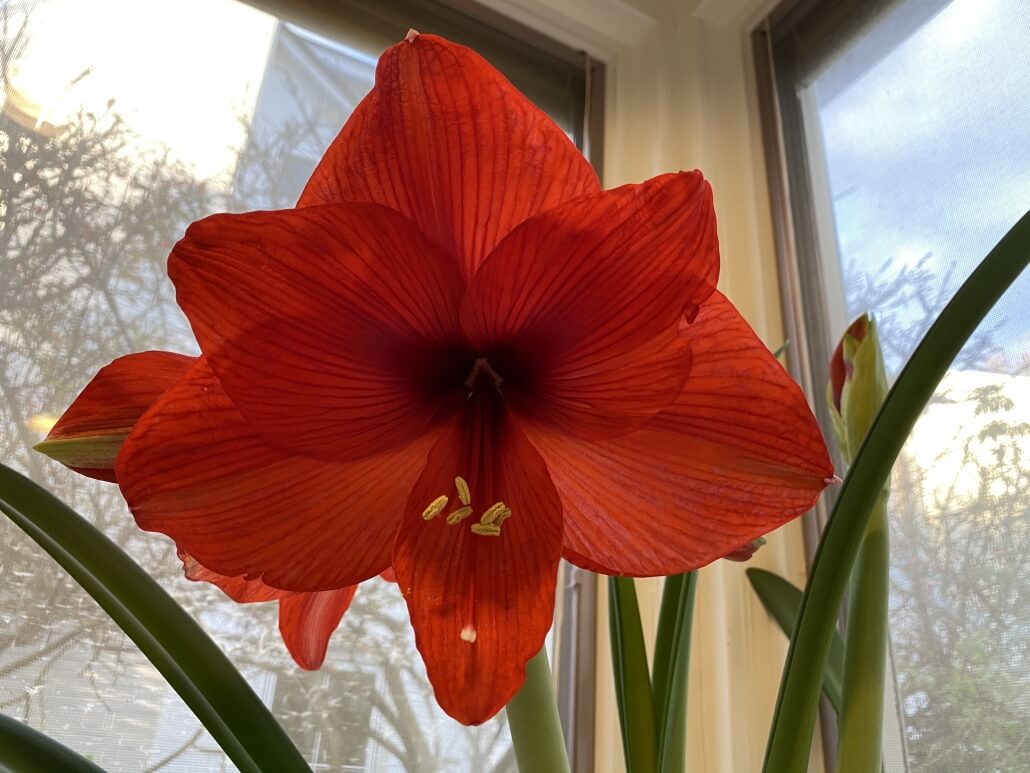
Last night our oldest came to the Thanksgiving table prepared. He read to us about the Piscataway Tribe, the indigenous people who lived on the land where we live and where we were sitting down to eat. After dinner he showed us the movie Awake: A Dream from Standing Rock (on Vimeo). It was a poem and a documentary. It was beautiful and heart-breaking and inspiring. This morning I am feeling grateful for his leadership, his learning, his teaching, for the abundance we share, for this year’s reminders to be grateful for everything, for people who stand up to injustice, for people who make art, for people who see the connections between this moment and so many others.
I was reminded of this poem by Joy Harjo.
BY JOY HARJO
The world begins at a kitchen table. No matter what, we must eat to live.
The gifts of earth are brought and prepared, set on the table. So it has been since creation, and it will go on.
We chase chickens or dogs away from it. Babies teethe at the corners. They scrape their knees under it.
It is here that children are given instructions on what it means to be human. We make men at it, we make women.
At this table we gossip, recall enemies and the ghosts of lovers.
Our dreams drink coffee with us as they put their arms around our children. They laugh with us at our poor falling-down selves and as we put ourselves back together once again at the table.
This table has been a house in the rain, an umbrella in the sun.
You can read the rest of the poem here on the Poetry Foundation website.
I hope you had a good, safe, healthy Thanksgiving no matter what form it took this year.
Liz
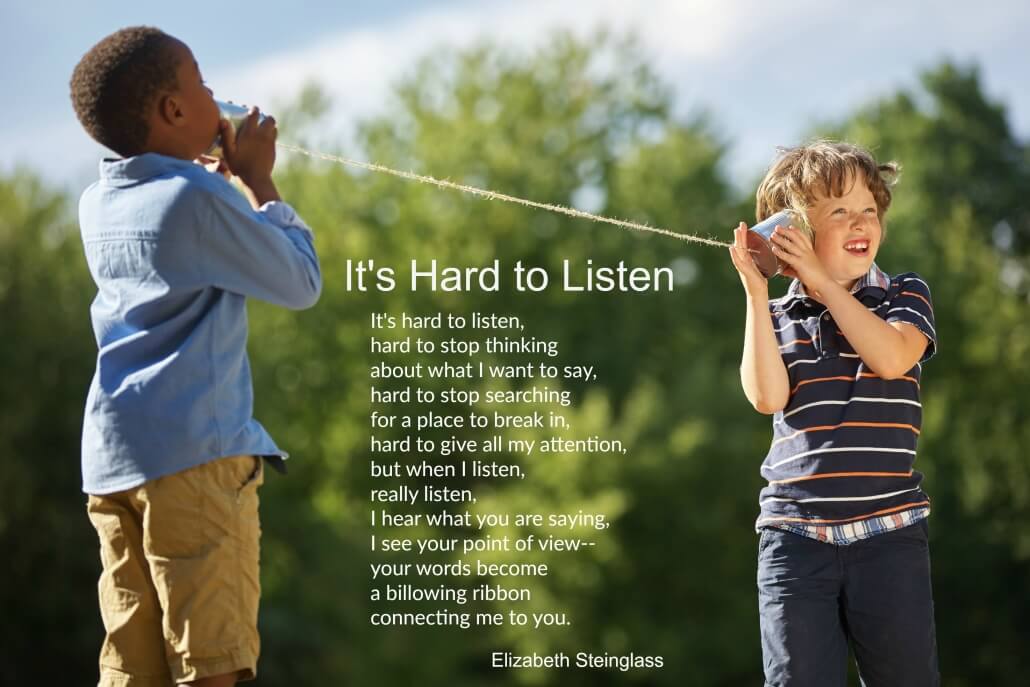
I wrote this yesterday. I suppose it’s more of a first draft. It’s something I’ve been thinking about, especially as I look at maps colored red and blue and wonder how we might begin to stitch ourselves back together.
I hope you’re all hanging in there.
Liz
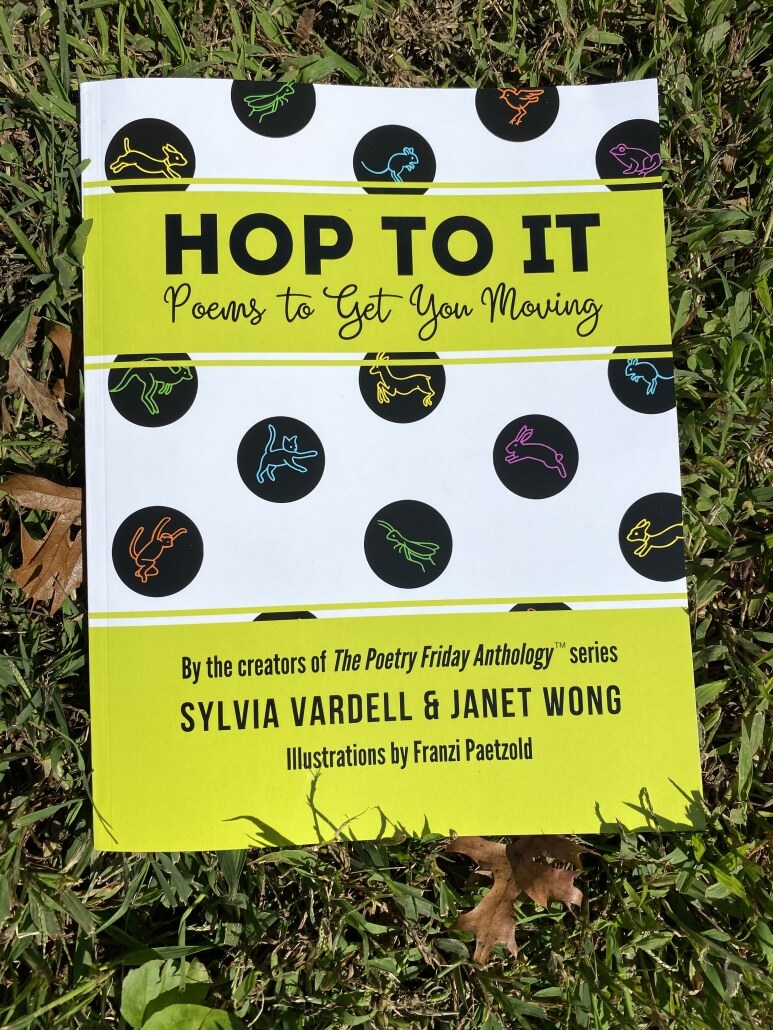
Sylvia Vardell and Janet Wong have done it again! Hop to It is their latest anthology of wonderful and current children’s poetry. This is truly the book kids need right now–a third of the poems are about movement, a third are about the pandemic, and a third are about social justice.
Here’s my poem about juggling a soccer ball.
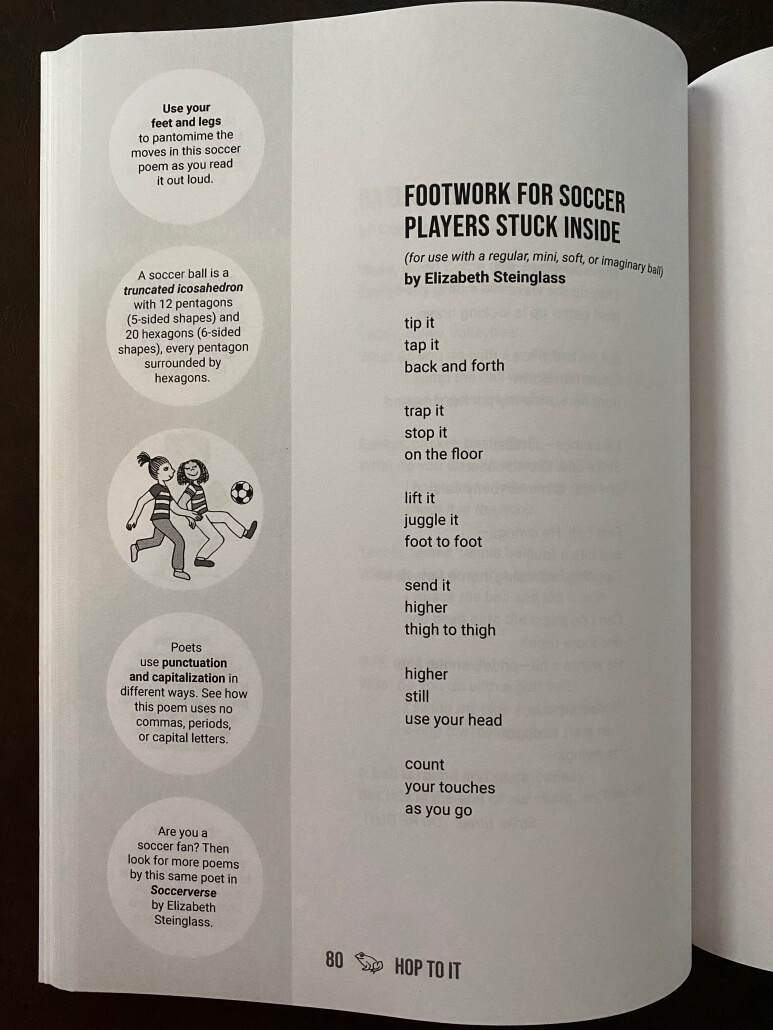
Footwork for Soccer Players Stuck Inside
(for use with a regular, mini, soft, or imaginary ball)
tip it
tap it
back and forth
trap it
stop it
on the floor
lift it
juggle it
foot to foot
send it
higher
thigh to thigh
higher
still
use your head
count
your touches
as you go
There are other poems sure to get you moving about baseball, baking, making music with your hands, yoga, meditation, and pretending to be a snake!
Many of the poems in the collection are especially powerful because they speak directly to the world we are living in right now. “I Smile with my Eyes” by David McMullin is about the expressions you can see when people are wearing masks. Many poems like “Staycation” by Michelle Schaub are about making the best of our time at home, but others like “Say When” by Leslie Ross-Degnan give voice to our longing for this time of distancing to end. There are also poems like “You Can Do It Right Now” by Janet Wong, “Stand Up” by Christy Mihaly, and “March!” by Suzy Levinson that point to the many ways we can speak up and demand a more just society.
As with every book edited by Sylvia and Janet, there are suggestions for how to read and enjoy the poems, things to notice about them, and additional tidbits of information about the subjects. There are also sweet little drawings by Franzi Paetzold. So…Hop to It get a copy and give a copy of this wonderful new book!
For more poetry Friday, visit Jama’s Alphabet Soup! I’m sure it will be delicious!
Liz
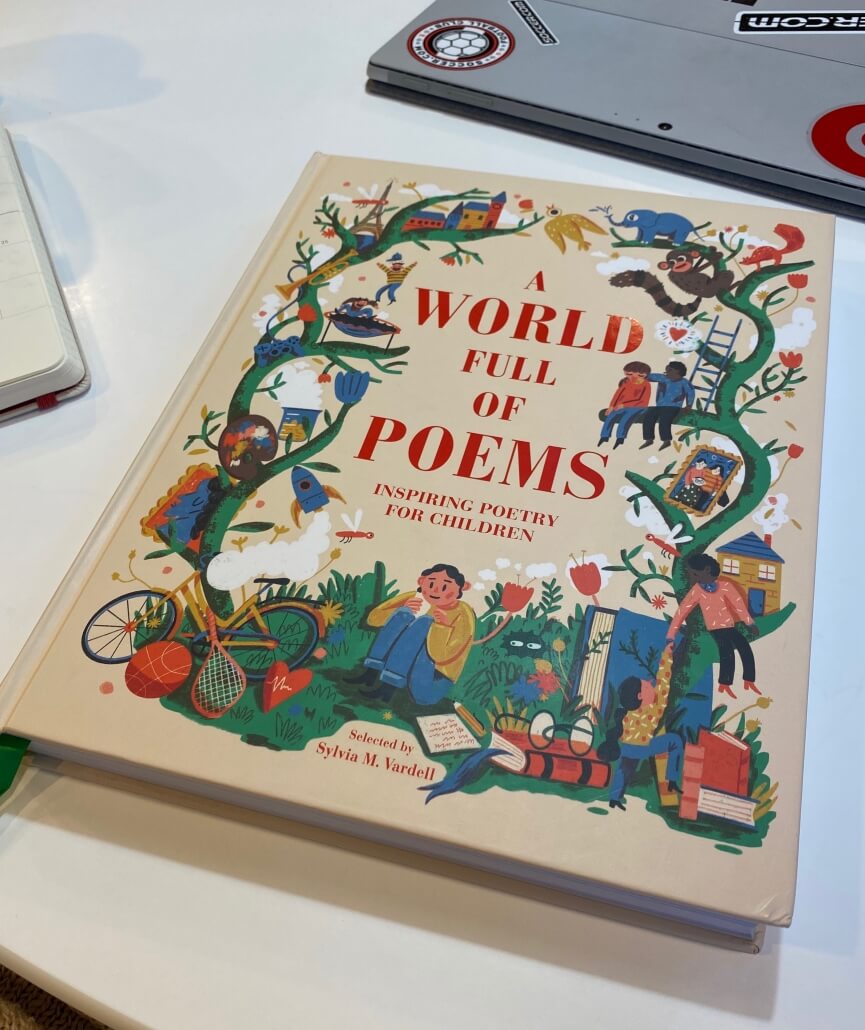
A World Full of Poems: Inspiring Poetry for Children, edited by Sylvia Vardell, had a birthday this week, so I thought I would celebrate by sharing some of the many things I love about this book.
The Size–I love how big it is! It is a big, fat beautiful book with a shiny green ribbon and would make a perfect birthday present or holiday gift.
The Illustrations–I love the fun, colorful illustrations! I love the little guy reading on the title page. I love the diverse loving families. I love the black cat, the kite, and the eyes peeking out of dark holes.
The Size of the print–I love that the print is big and accessible to new readers, dyslexic readers, and readers with older eyes!
The Introduction–I love Sylvia’s welcoming introduction calling on readers to explore as they like and offering such a feast of poetry that every reader can find something they find compelling.
The Sections–I love the eight sections of the book–Family and Friends, Feelings, Animals and Nature, Cities, Towns, and Travel, Fun and Games, Science and Art, Body and Health, A World of Learning–all of them meaningful, engaging, and varied, ensuring again that everyone will find something of interest.
The Poetry Activities–At the end of the book, Sylvia has included activities to encourage readers to engage with the poems and move from reading poems to writing them. Sylvia shows readers how to make poetry part of their days and their lives.
The Poems, of course!–The book includes poems by more than 100 poets from different places, backgrounds, and times. I am honored to be one of them.
I look forward to reading the book from cover to cover and to sharing it whenever I can.
For more Poetry Friday visit Bridget Magee at Wee Words for Wee Ones.
Hoping you and yours are well.
Liz
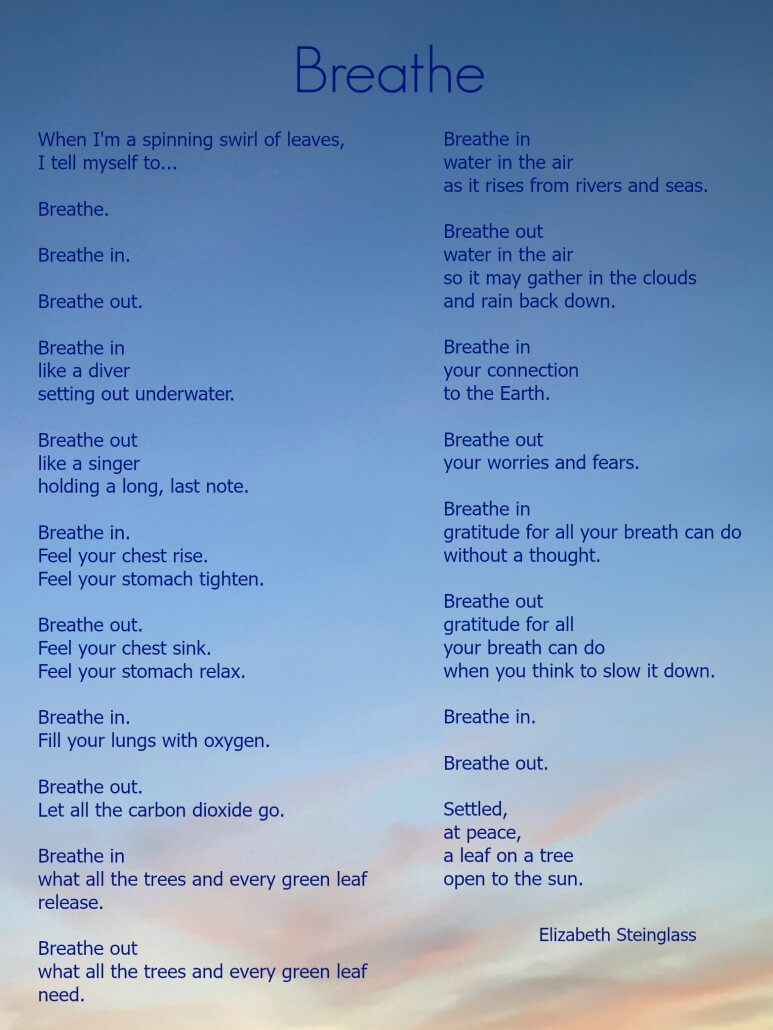
I don’t practice yoga, but before the pandemic I did take pilates from a wonderful teacher who also teaches yoga. She taught us about breathing in our pilates classes, and she inspired this poem.
Here I am reading it, if you’d like to listen and focus on your breath.
Jone has the roundup today at her new website, where she’s celebrating Sylvia Vardell and Janet Wong’s new anthology HOP TO IT. I’m jumping for joy for this one and thrilled to be included!
Liz
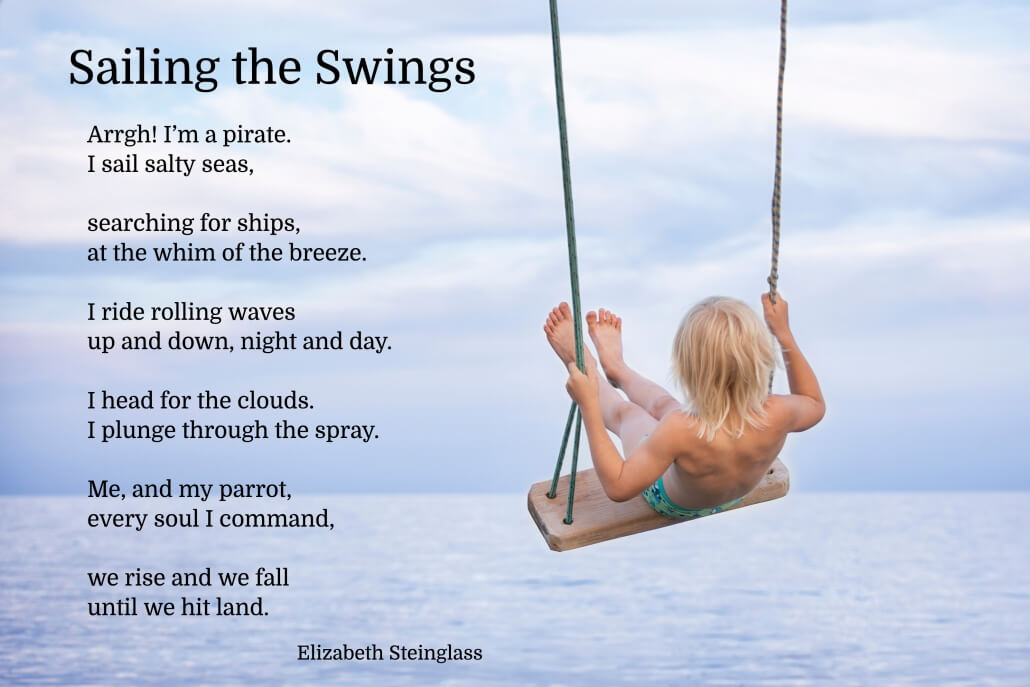
Earlier this week when I sat down to decide what to post today, I got an email from Laura Purdie Salas that said “Ready for Talk Like a Pirate Day?”
“Am I?” I wondered.
I thought for a few minutes, remembered this poem, and happily realized I am!
In a world with so many awful things going on, let’s, if we can, take a few moments to talk like a pirate, be silly, feel joy.
Matt Forrest Esenwine has the round-up today at his blog Radio, Rhythm & Rhyme.
Liz
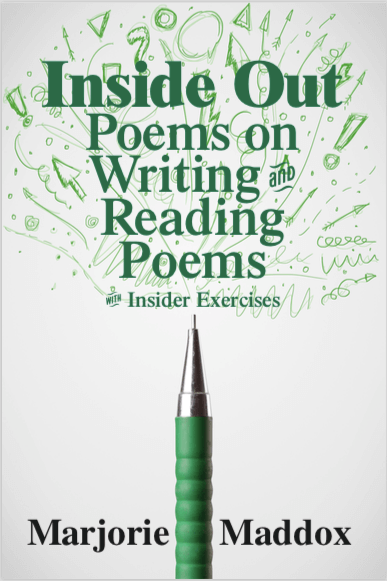
Begin
leap from the step
not knowing how
you’ll land
let your mind spin like a pinwheel
chase the flying shards of light
get distracted
by an ant
the scent of sliced cucumber
someone else’s words
stuff them up your sleeve
dump them on the table
make a mess in one room
move onto the next
come back later
to see what’s there
Elizabeth Steinglass
Last week I had the pleasure of reading Inside Out: Poems on Writing and Reading Poems with Insider Exercises by Marjorie Maddox. Marjorie is a professor of English and Creative Writing at Lock Haven University, winner of the 2019 Foley Poetry Prize, and the author of 11 collections of poetry, including Rules of the Game: Baseball Poems and A Crossing of Zebras: Animal Packs in Poetry. I met Marjorie many years ago at a workshop at the Highlights Foundation where she led us through a wonderful exercise on metaphor.
Intended for YA readers (like much of YA also can be enjoyed by adults!), the collection includes 27 poems that take on poetry through poetry. The first six poems are about connecting with poetry as a reader, using all our senses and getting to know a poem like you might a friend. Befriending a Poem describes a much more appealing approach than the tortured analysis Billy Collins describes in his poem (one of my favorites) Introduction to Poetry.
Befriending a Poem
Invite him home for dinner
but don’t insist on rhyme;
he may be as tired and as overworked
as his distant cousin Cliché.
Best to offer intriguing conversation
that’s light on analysis.
Allow for silences and spontaneity.
Most importantly, like any good friend,
be faithful and patient;
remember to listen.
Sometimes he’s shy
and just needs a little time and coaxing.
Much of what he has to say
lies between the lines.
I absolutely love the end of this poem—remember to listen, time and coaxing, between the lines. Just perfect.
The second set of poems addresses poetry tools, such as concrete and abstract language, metaphor and simile, personification, alliteration, line length, etc.
The couplet poem made me laugh out loud:
Couplet
Poetic twins all dressed in rhyme
stroll side-by-side in two straight lines.
The final set of poems are about various forms, for example the sonnet, the sestina and the villanelle, written of course in those forms.
I love the mash up of new and old and the clever reworking of the repeated lines in the poem “How to Text a Triolet.”
How to Text a Triolet
If you all want to text a triolet,
it really is no secret what to do.
First concentrate on what you have to say
and if you want to write. A triolet
says what you said before; it’s déjà vu,
though you can always change a word or two
if you all want. To text a triolet,
it really is no secret what to do.
The book ends with nine accessible and collaborative exercises that build on poems from the collection.
My poem, above, was written in response to Exercise 3: Tug of War between Concrete and Abstract. Though the exercise is intended for a group (and would be very fun that way!) I did it by myself. I wrote abstract words on little pieces of paper, grabbed one from my hat, and then did some freewriting about what the word made me see, smell, hear, touch, and taste. I then wrote a poem about the abstract concept without using the word for it. Marjorie suggests asking your writing friends if they can guess what your word was. Can you? Let me know your guesses in the comments.
The next one I want to try is Exercise 7: The Short and Long of It
In this one you find a poem you like, copy it twice as a block of words without breaks. Then you and a friend take the words and independently add breaks where you like. When you’re done, you compare and discuss your choices. At the end Marjorie suggests taking a poem you’ve written and rewriting it with different breaks.
What do you think?
Begin
Leap from the
step
not knowing how
you’ll land
let your mind spin
like a pin-
wheel
chase the flying
shards of
light get
distracted by an ant the scent
of sliced cucumber someone else’s
words
stuff them
up your sleeve
dump them
on the table make a mess
in one room move
onto the next
come back
later to see
what’s there
Well that was helpful! I think I’ll go back up to the top and make a little change…
To learn more about Inside Out, check out the reviews at Jama’s Alphabet Soup, Matt’s Radio, Rhythm & Rhyme, and Sylvia Vardell’s Poetry for Children. Better yet, order a copy or request one from your library, so you can read the whole thing.
Happy Poetry Friday. Franki and Mary Lee have the roundup at A Year of Reading.
I hope all is well with you and yours.
Liz
finding myself
raking patterns
in the litter box
This month at Michelle Heidenrich Barnes’ blog, Today’s Little Ditty, Margaret Simon put out the challenge to write “to write a mindful poem about the present moment,” a poem of presence. I think it may have been Heidi Mordhorst who suggested we try to make this a daily practice with a hashtag on twitter. With Margaret’s and Heidi’s challenges in mind, I’ve been trying to take a few minutes each day to check in with the world around me and quickly write a haiku or senryu. (A haiku if the observation is about nature, a senyru if the observation is about human nature.) Over the years when I’ve been able to make myself do challenges like this on a daily basis, I find that it changes my attention, and I am able to be present to myself on and off throughout the day. This is what happened yesterday when, true story, I observed myself cleaning the litter box.
Jama has the round up today at Jama’s Alphabet Soup.
I hope you all are well.
Liz